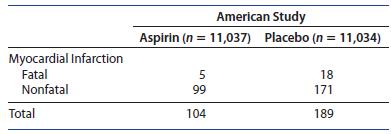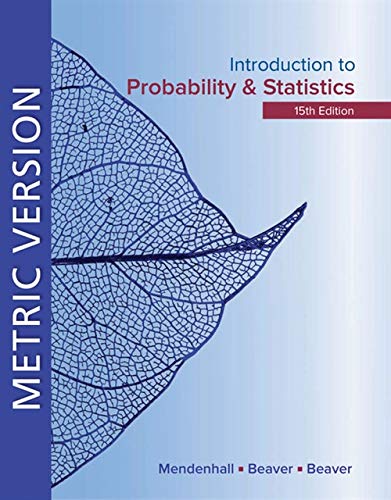1. Test whether the American study does in fact indicate that the rate of heart attacks for...
Question:
1. Test whether the American study does in fact indicate that the rate of heart attacks for physicians taking 325 mg of aspirin every other day is significantly different from the rate for those on the placebo. Is the American claim justified? On Wednesday, January 27, 1988, the front page of the New York Times read, “Heart attack risk found to be cut by taking aspirin: Lifesaving effects seen.” A very large study of U.S.
physicians showed that a single aspirin tablet taken every other day reduced by one-half the risk of heart attack in men.30 Three days later, a headline in the Times read, “Value of daily aspirin disputed in British study of heart attacks.” How could two seemingly similar studies, both involving doctors as participants, reach such opposite conclusions?
The U.S. physicians’ health study consisted of two randomized clinical trials in one. The first tested the hypothesis that 325 milligrams (mg) of aspirin taken every other day reduces mortality from cardiovascular disease. The second tested whether 50 mg of b-carotene taken on alternate days decreases the incidence of cancer. From names on an American Medical Association computer tape, 261,248 male physicians between the ages of 40 and 84 were invited to participate in the trial. Of those who responded, 59,285 were willing to participate. After the exclusion of those physicians who had a history of medical disorders, or who were currently taking aspirin or had negative reactions to aspirin, 22,071 physicians were randomized into one of four treatment groups: (1) buffered aspirin and b-carotene,
(2) buffered aspirin and b-carotene placebo, (3) aspirin placebo and b-carotene, and (4) aspirin placebo and b-carotene placebo. Thus, half were assigned to receive aspirin and half to receive b-carotene.
The study was conducted as a double-blind study, in which neither the participants nor the investigators responsible for following the participants knew to which group a participant belonged. The results of the American study concerning myocardial infarctions (the technical name for heart attacks) are given in the following table:

Step by Step Answer:

Introduction To Probability And Statistics
ISBN: 9780357114469
15th Edition
Authors: William Mendenhall Iii , Robert Beaver , Barbara Beaver






